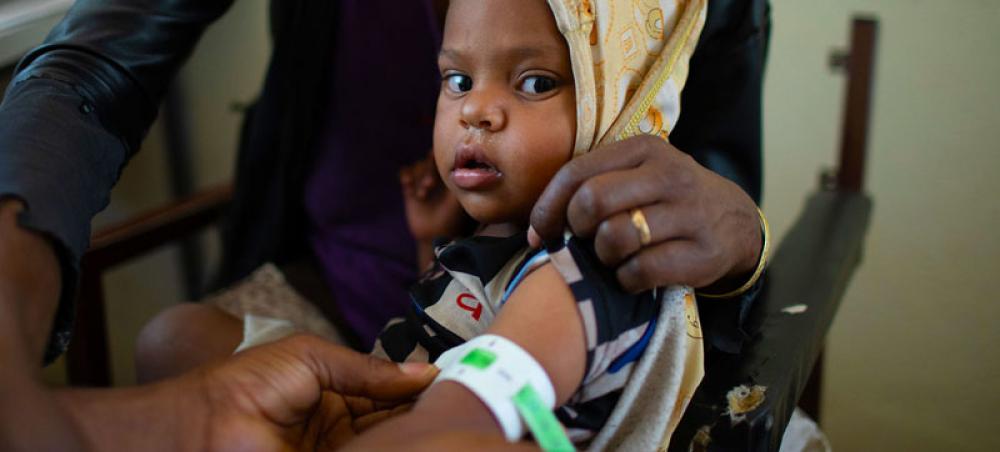Just Earth News | @justearthnews | 30 Jul 2021

Image: UNICEF/Mulugeta Ayene
New York: More than 100,000 children in Tigray, Ethiopia, could suffer from life-threatening severe acute malnutrition in the next 12 months, a tenfold jump over average annual levels, UN Children's Fund (UNICEF) said on Friday.
The development comes as UNICEF announced that it had recently reached areas of Tigray that were previously inaccessible owing to insecurity linked to nearly nine months of conflict between Government forces and those loyal to the Tigray People’s Liberation Front, or TPLF.
Worst fears
UNICEF spokesperson Marixie Mercado told a UN briefing in Geneva that humanitarians’ worst fears about the health and wellbeing of children have been realized.
Assessments also indicate that 47 per cent of pregnant and breastfeeding women are acutely malnourished, suggesting that they could face more pregnancy-related complications, an increased risk of maternal death during childbirth and the delivery of low-birthweight babies, who are much more prone to sickness and death.
"We need unfettered access into Tigray and across the region, in order to provide support children and women urgently need," she said, her comments coming as UN emergency relief chief Martin Griffiths and US aid relief (USAID) head, Samantha Power, reportedly planned to hold talks in Ethiopia this week to push for increased access in Tigray.
Aid convoy approaching
Meanwhile, World Food Programme (WFP) spokesperson Tomson Phiri, said that a convoy of more than 200 trucks was on its way to Tigray, but “this is a drop in the ocean.” At least 100 trucks are needed every day “if we are to stand a chance to reverse the catastrophic situation”.
Latest UN data indicates that humanitarian partners have reached nearly 3.7 million people. But the aid response has been slowed by cut-off communications services and widespread power cuts.
A further challenge is the fact that the movement of aid teams and supplies is only possible via one route, through the Afar region, which requires passing through multiple checkpoints, where humanitarian personnel have been interrogated, intimidated and in some instances detained, according to the UN Office for the Coordination of Humanitarian Affairs (OCHA).
Extreme danger
The operating environment in Tigray also remains extremely dangerous, said spokesperson Jens Laerke, noting that at least 12 aid workers had been killed to date, including on 24 June, when three Doctors Without Borders staff were murdered.
Humanitarian funding also remains a major problem, as more than $430 million is still needed to fund the aid response in Tigray until the end of the year.
In an appeal to all parties to the conflict, Mr. Laerke urged them to keep entry routes open to Tigray, to prevent large-scale loss of life, before appealing to the Ethiopian Government to allow humanitarians to bring in additional communications equipment, as well as provide longer visas for NGO staff.
Permissions call
The UN needs “critical communications equipment and longer-term visas for NGO staff” for its aid operation in Tigray, Mr. Laerke continued.
According to OCHA, 5.2 million people - about 90 per cent of the population – are now in need of life-saving humanitarian assistance and hundreds of thousands are facing famine-like conditions.
Mr. Laerke explained that the conflict in Tigray had started in the middle of the harvest season in November 2020, when a quarter of crops had already been ruined by locust swarms.
More than 90 per cent of what was left of the harvest was then looted, burned, or flattened, making it critical that farmers are provided now with the tools, assistance and access they need to sow their crops, he added.
Trauma of survivors
Speaking of her own recent experience in the region, UNICEF’s Ms. Mercado noted that one young female survivor of sexual assault told her that “she watched her grandmother get killed, she was raped by several men and she watched her nine month old baby being tossed around by other men”.
A doctor at a UNICEF supported referral centre in Mekelle, told her that he had been struck by the fact that in many cases it was not the assault itself, but rather the psychological damage it inflicts on children, women and health staff, that was most difficult to bear.